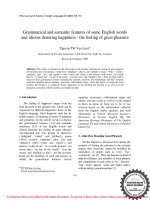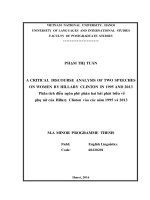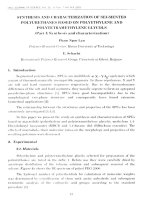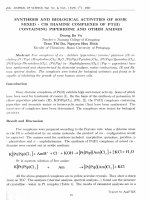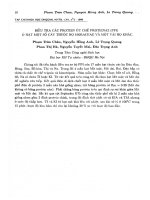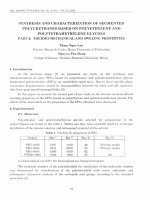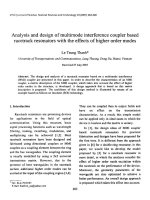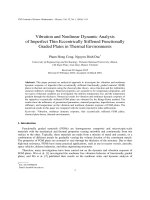DSpace at VNU: Grammatical and semantic features of some English words and idioms denoting happiness - the feeling of great pleasure
Bạn đang xem bản rút gọn của tài liệu. Xem và tải ngay bản đầy đủ của tài liệu tại đây (237.73 KB, 9 trang )
VNU Journal of Science, Foreign Languages 25 (2009) 165-173
Grammatical and semantic features of some English words
and idioms denoting happiness - the feeling of great pleasure
Nguyen Thi Van Lam*
Department of Foreign Languages, Vinh University, Nghe An, Vietnam
Received 4 February 2009
Abstract. This article is intended for the discussion of the lexemes denoting the feeling of great pleasure
sub-classified into four groups of adjectives (‘delighted’, ‘elated’, and ‘jubilant’); nouns (‘bliss’, ‘ecstasy’,
‘euphoria’, ‘glee’, ‘joy’, and ‘rapture’); verbs (‘exult’ and ‘rejoice’); and idioms (‘walk on air’, ‘in seventh
heaven’, ‘on cloud nine’, ‘on top of the world’, ‘over the moon’ and ‘thrilled to bits’). They are dealt with in
respect of their grammatical features including the syntactic functions and morphology, and their semantic
structures including lexical meaning, synonyms, collocational range, words and idioms of which the word
denoting the feeling is a constituent. Some suggestions in the teaching and learning of as well as in the
translation concerned with the lexemes are finally provided.
1. Introduction*
meaning, synonyms, collocational range and
idioms with the words as well as words related
to them in terms of form are to be of our
concern based on the information collected
from the English native speakers and such
dictionaries as Oxford Advanced Learner’s
Dictionary of Current English [6], The
American Heritage Dictionary of The English
Language [7] and Oxford Dictionary of English
Idioms [8].
The feeling of happiness ranges from the
least pleasure to the greatest one, which can be
expressed by different linguistics items in the
English language. Each linguistic item has its
subtle nuance of meaning in terms of grammar
and semantics. In this article, we are to discuss
the grammatical features [1,2] and semantic
structures [3-5] of the English words and
idioms denoting the feeling of great pleasure
sub-classified into four groups of adjectives
(‘delighted’, ‘elated’, and ‘jubilant’); nouns
(‘bliss’, ‘ecstasy’, ‘euphoria’, ‘glee’, ‘joy’, and
‘rapture’), verbs (‘exult’ and ‘rejoice’), and
idioms (‘walk on air’, ‘in seventh heaven’, ‘on
cloud nine’, ‘on top of the world’, ‘over the
moon’ and ‘thrilled to bits’). All the lexemes
listed are the headings of each sub-section, in
which the grammatical features, lexical
2. Adjectives Denoting Great Pleasure
All the adjectives discussed here denote the
property of feeling the pleasure to the extreme
degree; they, therefore, cannot be modified by
intensifiers of degree such as ‘very’, ‘too’,
‘extremely’, etc [1]. They can function as head of
adjectival phrases, pre-modifier of noun phrases,
and complement of such verbs as ‘be’, ‘become’,
‘feel’, ‘look’, ‘appear’, ‘seem’ and ‘make’ with or
without taking complementation [1].
______
*
Tel.: 84-(038)3555656.
E-mail:
165
166
N.T.V. Lam / VNU Journal of Science, Foreign Languages 25 (2009) 165-173
2.1. ‘Delighted’
2.1.1. Grammatical Features and Semantics
of ‘Delighted’
‘Delighted’ is an adjective having an
identical form with, but different features from,
the past participle of the verb ‘delight’, having
the syntactic functions as head of adjectival
phrases, pre-modifier of noun phrases and
complement. Morphologically, it has two
morphemes: the root delight and suffix-ed. By
means of derivation, the adverb ‘delightedly’ is
formed. It has no inflected word-forms for
comparative and superlative.
In terms of semantics, ‘delighted’ is specific
and frequently used. It denotes the property of
feeling great pleasure about something good
that has happened. It has the same descriptive
meaning with ‘happy’, ‘glad’ and ‘pleased’ in
their first sense - denoting the feeling of
pleasure about something good that has
happened, but different in term of degree of
feeling - expressive meaning, thus being their
descriptive synonyms. It can be modified by
‘absolutely’ in its restricted collocation
‘absolutely delighted’, and by ‘quite’ meaning
“totally”. ‘Delighted’ can function as
complement. When it is a subject complement,
it can take complementation types of
prepositional phrases with ‘about’, ‘at’, ‘by’
and ‘with’; that-clauses and to-infinitive postmodification as in:
His parents were absolutely delighted about
the baby.
I am delighted at your success / to hear of
your success.
He felt quite delighted to think that they
were safely gone [9].
‘Delighted’ in part of the sense of “showing
the feeling of great pleasure” can be used as
pre-modifier of noun phrases as in collocations
with such typical nouns as ‘child’, ‘lady’,
‘look’, ‘smile’, ‘spirit’, etc.
2.1.2. Words Formed from ‘Delighted’
‘Delightedly’ (adv) means “in a delighted
manner” and functions as adverbial as in:
She jumped up and took me delightedly in
her arms, just as she used to do [10].
‘Delight’ (v) can be intransitive and monointransitive, meaning “give great pleasure (to
somebody), please (somebody) greatly” as in ‘a
book that is certain to delight’. It is a
component of an idiom as phrasal verb ‘delight
in something/ doing something’ in the sense of
“enjoy or take great (and often cruel or wrong)
pleasure in something / doing something” as in:
He delighted in teasing his younger sister.
‘Delight’ (n) first as a non-count noun
denotes the feeling of great pleasure. Examples
are the restricted collocations ‘give delight to
somebody’ and ‘To one’s (great) delight’ or
prepositional phrases with ‘in’ and ‘with’,
either post-modified by prepositional phrases
with ‘at’ or not, as in:
I asked in delight [10].
… and [the old man] chuckled with delight
at his pupil’s proficiency [9].
‘Delight’ (n) can also be a count noun
denoting things that give great pleasure or
enjoyment. In addition, ‘delight’ (n) is a lexical
component in the semi-idiom ‘take delight in’,
which means “find pleasure in something /
doing something (especially something cruel or
wrong)”. ‘Delight’ (n) has two derivatives by
virtue of derivation: ‘delightful’ (adj) and
‘delightfully’ (adv). ‘Delightful’ (adj) has the
sense of “giving delight, very pleasing”, thus
descriptively synonymous with ‘pleasing’, e.g.:
And everything that is delightful to you is
delightful to me, Miss Spenlow! [10].
It can collocate with such typical nouns as
‘holiday’, ‘melody’, ‘conversation’, ‘news’, etc…
We have been concerned with ‘delighted’
together with other words and idioms related to
it in terms of form, which are, it follows, related
in meaning as well.
2.2. ‘Elated’
‘Elated’ is an adjective having an identical
form with, but different features from, the past
N.T.V. Lam / VNU Journal of Science, Foreign Languages 25 (2009) 165-173
participle of the verb ‘elate’, having the
syntactic functions as head of adjectival
phrases, pre-modifier of noun phrases and
complement. Morphologically, it has two
morphemes: the root elate (v) and suffix-ed. It
has no inflected forms for comparative and
superlative. It has two derivatives ‘elation’ (n)
and ‘elatedly’ (adv).
Semantically, ‘elated’ is specific and
formally used to describe a very high level of
‘delight’. It can also contain an idea of triumph.
In other words, it denotes the property of
feeling very happy and proud, especially
because you have achieved something that is
important to you. It is however infrequently
used. In this sense, it cannot function as premodifier, but as complement with or without
taking complementation. The complementation
types of ‘elated’ as a subject complement are
prepositional phrases with ‘at’ and ‘by’, thatclauses, and to-infinitive post-modification as in:
Jeremy felt elated at / by this sudden and
unexpected success;
We were all elated that we had won / to
hear of the victory.
In the sense of “showing excited delight and
pride”, ‘elated’ can also be a pre-modifier of
noun phrases, exemplified by ‘the elated
crowd’, ‘an elated smile’, etc..
‘Elate’ (v) means “make happy and proud”
as in:
Her success elated the family.
‘Elation’ (n) as a non-count noun, denotes
the feeling of great happiness and pride as in:
She was filled with elation when her
daughter was born.
It has a restricted collocation with the
intensifying adjective ‘sheer’ as an emphasizer
[1]: ‘sheer elation’.
2.3. ‘Jubilant’
‘Jubilant’ as an adjective can function as
pre-modifier and complement in sentences. It is
167
a one-morpheme word with two derivatives
‘jubilation’ (n) and ‘jubilantly’ (adv). In terms
of semantics, it is formally used to denote the
property of feeling very happy and proud
especially because of something good you have
achieved as in:
The climbers were jubilant after reaching
the top of Everest.
It can also contain an idea of feeling happy
because something bad has happened to
someone else. It is not commonly used. In the
sense of “showing great happiness, especially at
a success”, ‘jubilant’ can also be a pre-modifier
of noun phrases as in ‘a jubilant mood’,
‘jubilant shouts’, etc.
‘Jubilation’ (n) denotes the feeling of great
happiness and pride in one sense and a
celebration or other expression of great
happiness in the other sense.
3. Nouns Denoting Great Pleasure
Apart from the noun ‘delight’ discussed
under the heading of ‘delighted’, the nouns
denoting great pleasure discussed in this section
include ‘bliss’, ‘ecstasy’, ‘euphoria’, ‘joy’ and
‘rapture’. The words and idioms, if available,
are dealt with as well.
3.1. ‘Bliss’
‘Bliss’ is a non-count noun with two
derivatives ‘blissful’ (adj) and ‘blissfully’
(adv). ‘Bliss’ used in literature denotes the
complete or perfect happiness as in ‘a life of
bliss’, ‘a young couple in married bliss/ in
wedded bliss’. ‘Bliss’ can collocate with ‘in’ in
prepositional phrases, as in:
If there's another world, he lives in bliss [11]
And with such adjectives as ‘everlasting’,
‘immortal’, ‘perfect’, ‘sheer’, ‘pure’, etc., e.g.:
All that in this delightful garden grows,
Should happy be, and have immortal bliss.
[11].
168
N.T.V. Lam / VNU Journal of Science, Foreign Languages 25 (2009) 165-173
In terms of syntactic functions, ‘bliss’ can
be subject, object and complement, as in:
Bliss was it in that dawn to be alive
Follow your bliss [11]
‘Blissful’ (adj) is mostly used formally and
in literature to describe an occasion, situation or
period of time when someone feels extremely
happy and not worried about anything as in ‘the
first day of his or her marriage’. It can also
describe a romantic feeling that is totally
complete and leaves you feeling extremely
happy. In addition, ‘blissful’ can restrictedly
collocate with ‘ignorance’. ‘Blissfully’ (adv)
also has restricted collocations with ‘happy’,
‘ignorant’ and ‘unaware’. ‘Blissfully happy’
means “feeling extremely happy, for example,
because of being in love or because something
very good has happened to someone”. Today it
is only used in a slightly comic style as in ‘the
blissful smile of the cat who stole the cream’.
3.2. ‘Ecstasy’
‘Ecstasy’ can be a non-count noun and a
count one having the same syntactic function of
nouns. As a one-morpheme word, it has two
derivatives ‘ecstatic’ (adj) and ‘ecstatically’
(adv). ‘Ecstasy’ has two descriptive meanings.
It first denotes a state of a very strong feeling of
happiness or delight as in:
This is the very ecstasy of love [11]
‘Ecstasy’ can function as subject, object and
complement in sentences, as in:
To burn always with this hard, gemlike
flame, to maintain this ecstasy, is success in life
[11]
Ecstasy affords the occasion and
expediency determines the form [11]
The non-count or plural forms of ‘ecstasy’
can join the collocations ‘be in ecstasy /
ecstasies over something’, ‘go/ be thrown / etc.
into ecstasy / ecstasies over something’, as in:
Dissolve me into ecstasies,
And bring all Heaven before mine eyes [11]
‘Ecstasy’ has its second sense informally
used to denote an illegal drug used by young
people to give a feeling of great pleasure.
‘Ecstatic’ (adj) has its sense of “being in a state
of ecstasy, feeling extremely happy and excited
about something”. It is very specific: one may
be ecstatic about something - it is too intense an
emotion to last long - the whole body and mind
is excited because something, usually
unexpected or very much longed-for, has
happened. It can be used informally, formally
and in literature, but it is actually not common.
‘Ecstatic’ can occur with ‘absolutely’, as in:
She was absolutely ecstatic when I told her
the news.
3.3. ‘Euphoria’
‘Euphoria’ is a non-count noun which can
play the syntactic functions of a noun phrase as
a subject, object and complement. By means of
derivation, it can form three derivatives:
‘euphoric’ (adj), ‘euphorically’ (adv), and
‘euphoriant’ (n). With regard to the semantics
of ‘euphoria’, it denotes a feeling of great
happiness or well-being. It is mostly formal and
literary but not common in real life. ‘Euphoric’
(adj) is also very limited in use. It applies to
extreme happiness, almost a trance of happiness
- as can be temporarily induced by drugs or
huge emotional pleasure. At such a time nothing
can hurt or impede you. ‘Euphoriant’ (n) denotes
a drug that tends to produce euphoria.
‘Euphoriant’ can be an adjective by means of zero
derivation applied to ‘euphoriant’ (n).
3.4. ‘Glee’
‘Glee’ is both a count noun and a non-count
one sharing the functions of nouns. As a onemorpheme word, it has two derivatives ‘gleeful’
(adj) and ‘gleefully’ (adv) by means of
derivation, and two compounds ‘glee club’ (n)
and ‘gleeman’ (n) by means of compounding.
‘Glee’ has two descriptive meanings. As a noncount noun, it denotes a feeling of great delight,
N.T.V. Lam / VNU Journal of Science, Foreign Languages 25 (2009) 165-173
especially jubilant delight resulting from a
particular circumstance, such as winning a
victory as in:
Her glee knew no bounds when she crossed
the finish line first;
and it may suggest spiteful pleasure such as
that experienced at another's bad fortune as in:
He laughed with glee when he learned of
his opponent’s defeat.
‘Gleeful’ is an adjective functioning as premodifier of noun phrases and complement in
sentences and denotes the property of showing
glee, delight and excitement, often because of
someone else’s foolishness or failure. It can
collocate with ‘faces’, ‘laughter’, etc. It is
infrequently used in real life. ‘Gleefully’ means
“in a gleeful manner” and functions as
adverbial in sentences as in:
The old man rubbed his hands gleefully
together…[9].
‘Glee’ in its second sense is a count noun
denoting a song or an unaccompanied part song
scored for three or more male voices that was
popular in the 18th century. The two compounds
of ‘glee’ have their senses related to this sense of
‘glee’. ‘Glee club’ (n) denotes a group of singers
who perform usually short pieces of choral music,
and ‘gleeman’ (n) denotes a medieval itinerant
singer.
169
3.5. ‘Joy’
Semantically, ‘joy’ has three senses. First,
‘joy’ is used informally, formally and in
literature to denote the feeling of great
happiness. It suggests an intense and especially
an ecstatic state; the word is often associated
with sharing, self-realization, or highmindedness as in:
The deep joy we take in the company of
people with whom we have just recently fallen
in love is undisguisable [11]
‘Joy’ can function as subject, object and
complement in sentences as in:
The joy of life is variety; the tenderest love
requires to be rekindled by intervals of absence.
[11]
Love begets love. This torment is my joy
[11]
‘Joy’ is used in prepositional phrases with
‘with’, ‘to’, ‘for’ and ‘in’ as in ‘To my joy’,
‘jump for joy’, and ‘begin in joy’. Prepositional
phrases with ‘of’ or ‘at’ can be its postmodifiers. In the second sense of “a person or
thing that brings great happiness”, ‘joy’ is a
count noun as in:
My child is a great joy to me.
In British English, ‘joy’ is also informally
used in questions and negatives as a non-count
noun in the sense of “success” as in:
I tried to get her on the phone, but I didn’t
have any joy.
3.5.1. Grammatical Features and Semantics
of ‘Joy’
Like other nouns discussed above, ‘joy’ has
the same syntactic functions. Morphologically,
as a one-morpheme word, it has such
derivatives as ‘joyful’ (adj), ‘joyfulness’ (n),
‘joyfully’ (adv); ‘joyless’ (adj), ‘joylessness’
(n), ‘joylessly’ (adv); ‘joyous’ (adj),
‘joyousness’ (n), ‘joyously’ (adv). By virtue of
compounding, it has such compounds as ‘joy
ride’ (n), ‘joy ride’ (v), ‘joy rider’ (n), ‘joy
riding’ (n), ‘joy ride’ (v), ‘joystick’ (n), and
‘overjoyed’ (adj).
3.5.2. Idioms and Words Formed from ‘Joy’
As far as idioms in which ‘joy’ is a lexical
constituent are concerned, ‘joy’ is related to
three idioms in terms of both form and
meaning. ‘Somebody’s pride and joy’ as a
literal idiom denotes a person or thing of which
somebody is proud. ‘Full of joys of the spring’
functioning as complement means “lively and
cheerful”. ‘No joy’ is also a literal idiom in
which ‘joy’ has its third sense discussed above,
meaning that you have not had the luck, news,
or information in which you were hoping for.
170
N.T.V. Lam / VNU Journal of Science, Foreign Languages 25 (2009) 165-173
‘Joyful’ (adj) is a formal word, having the
senses of “full of or showing joy” and “causing
joy as in its collocations with such typical
nouns as ‘person’, ‘scene’, ‘celebrations’,
‘occasion’, ‘births’, etc.. ‘Joyless’ (adj) is the
antonym of ‘joyful’ and ‘unhappy’, meaning
“without joy”, e.g. ‘a joyless affair’, ‘a joyless
marriage’. ‘Joyous’ (adj), a formal word used in
literature, means “bringing joy to someone” and
it refers to a song or event - rarely personal. It
collocates with ‘song’, ‘occasion’, ‘sense of
freedom’, and other nouns. These adjectives
have their syntactic functions as head of
adjectival phrases, pre-modifier of noun phrases
and complement in sentences. ‘Joyful’ (adj) and
‘joyous’ (adj) are infrequently used in real life.
‘Joyride’ (n) is an informal and slang word
denoting a ride taken for pleasure and often for
the thrills provided by reckless driving or a
hazardous, reckless, often costly venture.
‘Joyride’ (v) means “take a joyride”. ‘Joyrider’
(n) denotes people who joyrides. ‘Joyriding’ (n)
denotes the act of taking a joyride. ‘Joystick’
(n) as a count noun denoting an upright handle
moved to control the operation of something,
e.g. the movement of an aircraft. ‘Overjoyed’
(adj), a synonym of ‘delighted’, denotes the
property of feeling extremely happy as the
response to an event, gift, success, etc.. It can
be informal, formal and literary. It is used as
complement only taking the complementation
types of prepositional phrases with ‘at’; thatclauses and to-infinitive post-modification as in:
She was overjoyed at the news.
We were overjoyed (to hear) that they were safe.
3.6. ‘Rapture’
‘Rapture’ can be used as a non-count noun
or in plural form. By means of derivation, it has
such derivatives as ‘rapturous’ (adj),
‘rapturously’ (adv) and ‘enrapture’ (v). It is
formally used to denote a feeling of intense
delight as in:
Oliver would sit by one of the windows,
listening to the sweet music, in a perfect rapture [9]
‘Rapture’ is used in prepositional phrases
with ‘in’ and ‘with’ and prepositional phrases
with ‘of’ or ‘at’ can be its post-modifiers. The
plural form ‘raptures’ can join the collocations
‘be in / go into raptures at / about / over
somebody / something’, meaning “feel or
express great delight or enthusiasm” as in:
She went into / was in raptures at the news.
‘Rapturous’ (adj) means “expressing great
delight or enthusiasm, especially the great
delight that fills you and carries you beyond
yourself, usually of short duration”. It can
function as pre-modifier of noun phrases with
such typical nouns as ‘applause’, ‘welcome’,
‘reception’, ‘look’, etc.. It is, however, rarely
seen today. ‘Rapturously’ (adv) means “in a
rapturous way”, exemplified in:
Mr. Bumble, seeing with excruciating
feelings, the delight of the two old paupers, who
were tittering together most rapturously,
hesitated for an instant [9].
‘Enrapture’ (v) as a mono-transitive verb is
formally used in the sense of “to fill somebody
with great delight or joy”, as in:
The beauty of her singing enraptured us.
4. Verbs Denoting Great Pleasure
In this section, we are to deal with two
verbs denoting happiness: ‘exult’ and ‘rejoice’.
They share the categorical meaning of
intransitive verbs, playing the central function
in sentences and taking complementation. They
are near-synonyms.
4.1. ‘Exult’
‘Exult’ usually takes the complementation
types of prepositional phrases with ‘at’, ‘in’ and
‘over’. In terms of morphology, it is a onemorpheme word with three derivatives
‘exultation’ (n), ‘exultant’ (adj) and ‘exultantly’
(adv). Semantically, it has a sense of “show
N.T.V. Lam / VNU Journal of Science, Foreign Languages 25 (2009) 165-173
171
great delight and pleasure, often at the defeat or
failure of someone else, celebrate”, as in:
The soldiers exulted at their victory.
The soldiers exulted over their defeated
enemies.
‘Exult’ is a formal word and is usually
found in literature. ‘Exultation’ (n) denotes the
feeling of great delight or pleasure. ‘Exultant’
(adj) is also a formal word and is usually used
in literature. It denotes the property of feeling
pleasure when something bad has happened to
someone else, especially because they have
been defeated in some way:
He was exultant. “They lost the game”, he
shouted.
The victory rejoiced the heart of the whole
nation.
‘Rejoicing’ (n) as a non-count noun is a
literary or formal word. It denotes the feeling of
great and uncontrolled joy, especially shown by
a number of people. ‘Rejoicing’ can be a count
noun, but is always used in plural form to
denote celebrations.
We have worked on the two verbs denoting
happiness. They are near-synonymous for the
reason that they express the feeling of pleasure,
but in different way. ‘Exultant’ as an adjective
denoting the property of happiness has also
been concerned with. In the next section, we
shall deal with the idioms denoting happiness.
4.2. ‘Rejoice’
5. Idioms Denoting Great Pleasure
Like ‘exult’, ‘rejoice’ usually takes the
complementation types of prepositional phrases
with ‘at’, ‘over’ and ‘with’; that-clauses and toinfinitive post-modification. Morphologically,
as a one-morpheme word, ‘rejoice’ has only one
derivative ‘rejoicing’ as a noun. ‘Rejoice’ has
the sense of “feel or show great joy”, as in:
They all rejoiced that the war was over.
It is formally used, especially in religion
and literature.
Rejoice with me; for I have found my sheep
which was lost [11].
In British English, it has a humour sense of
“have (a particular name or title, especially one
that is silly and amusing)”, e.g.:
He rejoiced in the name of Pigg.
‘Rejoice’ is a component of the pure idiom
as a phrasal verb ‘rejoice in’. ‘Rejoice’ is a
transitive verb but with no passive form. This
idiom means “have, possess (something that
brings happiness)”, e.g.:
They rejoiced in their good fortune.
Another idiom of which ‘rejoice’ is a
component is ‘rejoice somebody’s heart/ the
heart of somebody’ meaning “make someone
feel glad”, as in:
The following idioms denoting happiness
are to be discussed in this section: ‘walk on air’,
‘in seventh heaven’, ‘on cloud nine’, ‘on top of
the world’, ‘over the moon’ and ‘thrilled to
bits’. The idiom ‘walk on air’ acts an
intransitive verb, ‘thrilled to bits’ is an
adjectival phrase, and the others are
prepositional phrases which can function as
complement or adverbial in sentences. They are
all pure idioms informally used. ‘Walk on air’
describes the euphoric behaviour of someone
who is very happy or elated usually because
something great but totally unexpected has
happened to them as in:
She’s been walking on air ever since she
met Julia.
‘In seventh heaven’ denotes the property of
feeling very happy about something or enjoying
oneself immensely as in:
Gloria was in seventh heaven as she
wandered around the shops knowing she could
buy whatever she liked.
‘On cloud nine’, synonymous with
‘euphoric’, denotes the property of feeling
extremely happy, usually for those who are in
love or have just got a promotion, etc., as in:
172
N.T.V. Lam / VNU Journal of Science, Foreign Languages 25 (2009) 165-173
He was on cloud nine after winning the
competition.
‘On top of the world’ denotes the property of
feeling extremely happy and proud, especially
because of success, good fortune or something
good and material that has happened, e.g. a
promotion, winning a lottery. Everything is going
well for the one who is on top of the world.
‘Over the moon’ means “delighted about
something”. It is informally used in England,
but not much in Canada. When someone is over
the moon, he/she is euphoric to a greater degree
than the degree ‘on cloud nine’ expresses, as in:
The whole team were over the moon at
winning the competition.
‘Thrilled to bits’ means “very surprised and
very happy about something”. It refers to a kind
of physical feeling of happiness. Something
good and unexpected has happened to those
who are thrilled to bits. It is used informally
and more common than other idioms,
exemplified in:
I was thrilled to bits with the gift from my
family/when I received her marks from the
research paper.
All these idioms have the same descriptive
meaning with the adjectives denoting the
property of feeling extremely happy such as
‘delighted’, ‘elated’, ‘ecstatic’ and ‘jubilant’.
They can be used informally and in literature.
6. Conclusion
In conclusion, the English words and
idioms denoting happiness - the feeling of great
pleasure are very interesting to study. As can be
seen in the discussion, of all the lexemes
denoting the feeling of great pleasure, ‘ecstasy’,
‘glee’; and ‘rejoice’ are polysemous while
‘delighted’, ‘elated’, ‘gleeful’, ‘jubilant’, and
‘overjoyed’; ‘bliss’, ‘euphoria’, ‘rapture’; and
‘exult’ are not. Their grammatical features
depend on the sub-classes they belong to, but
each word may not have all the grammatical
features that its sub-class has. All of them can
join the three word-formation processes of
derivation, back-formation and compounding to
produce new lexemes. In teaching and learning
as well as translating these words and idioms,
their subtle nuance of meaning should be paid
attention to. The teacher should, therefore,
apply more than one technique of presenting
their meaning such as giving context, synonyms
(descriptive, though), antonyms, and associated
ideas or collocations [12]. The translator should
carefully analyze the message to be conveyed in
order to make a happy choice of the words and
idioms in question. Hopefully, the article is of
some good use for English learners, teachers
and translators.
References
[1] R. Quirk, S. Greenbaum, G. Leech, J. Svartvik, A
Grammar of Contemporary English, Longman,
London, 1972.
[2] G. Yule, The Study of Language, Cambridge
University Press, Cambridge and New York, 1985.
[3] J. Lyons, Semantics, Cambridge University Press,
Cambridge, 1977.
[4] J. Lyons, Linguistics Semantics: An Introduction,
Cambridge University Press, Cambridge, 1995.
[5] C. Fernando, Idioms and Idiomaticity, Oxford
University Press, Oxford and New York, 1996.
[6] Oxford Advanced Learner’s Dictionary of Current
English, Encyclopedic Edition, Oxford University
Press, Oxford, 2000.
[7] The American Heritage Dictionary of The English
Language, Houghton Mifflin, Boston, 2000.
[8] A.P. Cowie, R. Mackin, I.R. McCaig, Oxford
Dictionary of English Idioms, Oxford University
Press, Oxford, 1993.
[9] Bennett, A. (ed.), Oliver Twist, Heinmann
Educational, Oxford, 1993.
[10] Bassett, J. (ed.), David Copperfield, Oxford
University Press, Oxford, 2000.
[11] Kaplan, J. (ed.) Hine, T. (Multimedia ed.), Bartlett’s
Familiar Quotations. Expanded Multimedia
Edition. USA, 1995.
[12] P. Ur, A Course in Language Teaching: Practice
and Theory, Cambridge University Press,
Cambridge, New York and Melbourne, 1996.
N.T.V. Lam / VNU Journal of Science, Foreign Languages 25 (2009) 165-173
173
Đặc điểm ngữ pháp và ngữ nghĩa của một số từ và thành ngữ
tiếng Anh chỉ hạnh phúc - cảm giác rất hạnh phúc
Nguyễn Thị Vân Lam
Khoa Ngoại ngữ, Trường Đại học Vinh, Nghệ An, Việt Nam
Bài báo này bàn đến bốn nhóm từ vị tiếng Anh chỉ cảm giác rất hạnh phúc: tính từ (‘delighted’,
‘elated’, và ‘jubilant’); danh từ (‘bliss’, ‘ecstasy’, ‘euphoria’, ‘glee’, ‘joy’, và ‘rapture’); động từ
(‘exult’ và ‘rejoice’); và thành ngữ (‘walk on air’, ‘in seventh heaven’, ‘on cloud nine’, ‘on top of the
world’, ‘over the moon’ và ‘thrilled to bits’). Chúng tôi chỉ đề cập đến các từ vị này về các đặc điểm
ngữ pháp - cú pháp và tình thái, và ngữ nghĩa - nghĩa từ vựng, đồng nghĩa, kết hợp từ, các từ và thành
ngữ có chứa các từ chỉ cám giác rất hạnh phúc. Qua đây chúng tôi đưa ra gợi ý trong việc dạy học và
dịch thuật liên quan các từ vị tiếng Anh này.
